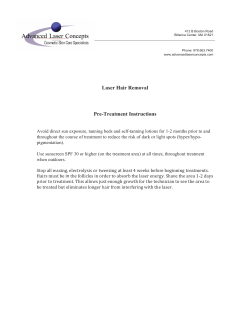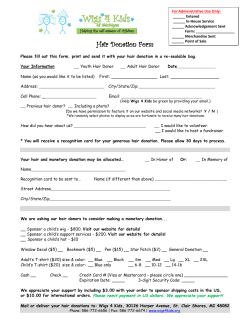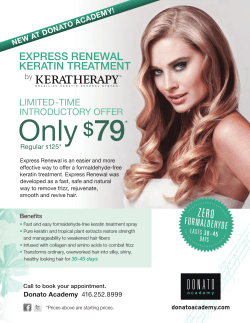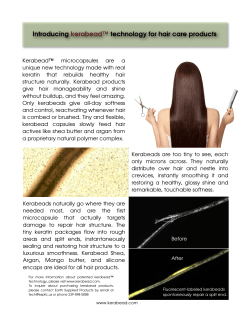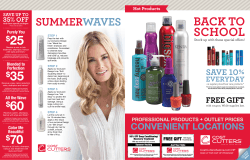
501 ppt BM Three
HAIR CARE http://www.webmd.com/skin-problems-and-treatments/slideshow-hair-and-scalp-conditions HAIR CARE 2 Hair care includes • • • • Daily brushing and combing Styling Shampooing Keeping hair tools clean Nursing Fundamentals 7243 5.01 3 HAIR CARE • Because hair style is personal preference, ask about style • Make brushing and combing part of morning care Nursing Fundamentals 7243 5.01 4 HAIR CARE • Protect resident’s clothing by placing towel around shoulders • Cover pillow with towel for residents confined to bed Nursing Fundamentals 7243 5.01 5 HAIR CARE • Brushing hair: –refreshes resident –improves morale –stimulates circulation –distributes natural oils evenly –removes lint and dust • Handle hair gently when brushing or combing Nursing Fundamentals 7243 5.01 6 HAIR CARE • Section hair and work on one area at a time • Note appearance of scalp and hair • Hair style should be age appropriate Nursing Fundamentals 7243 5.01 7 HAIR CARE • Residents are encouraged to do as much as possible for themselves • Comb and brush are cleaned after use • Combs and brushes are never shared Nursing Fundamentals 7243 5.01 8 HAIR CARE • Frequency individualized • Resident’s shampoo, conditioner and other hair care products are used • Resident assisted to beauty shop if available Nursing Fundamentals 7243 5.01 9 HAIR CARE Methods of shampooing: • during shower • at sink • using stretcher • in bed • dry shampoos Nursing Fundamentals 7243 5.01 10 HAIR CARE • Eyes and ears protected • Hair dried as fast as possible • Cold or drafty areas eliminated • Female residents assisted to curl or set hair Nursing Fundamentals 7243 5.01 11 HAIR CARE • Barbers or beauticians may be contacted by facility to care for hair of residents • Care plan to be checked for any special instructions prior to shampooing Nursing Fundamentals 7243 5.01 HAIR CARE - FYI 12 Traction Alopecia Damages Follicles Pulling hair too tight -- as can happen with ponytails, braids, and cornrows -- can damage hair follicles and cause hair to break or fall out. Hair extensions and hairpieces can sometimes cause traction alopecia, too, because their extra weight pulls on existing hair. Changing your hairstyle usually lets hair grow back. Pulling hair back tightly for a long time, though, can lead to http://www.webmd.com/skin-problems-and-treatments/slideshow-hair-and-scalp-conditions permanent hair loss. Nursing Fundamentals 7243 5.01 HAIR CARE - FYI 13 Head Lice: Itchy! In hair — that's where you'll find lice. They like to hide in the neck area of the scalp and behind the ears. If you have lice, you likely got it from sharing a hat, brush, or other item with a person who has http://www.webmd.com/allergies/slideshow-bad-bugs lice. Lice are itchy, but scratching can lead to infection. In severe Nursing Fundamentals 7243 5.01 cases, hair may fall out. MAKE UP http://www.wikihow.com/Apply-Makeup 15 MAKE UP • Apply make-up per resident wishes • Apply make-up in an age appropriate manner • Do not share make up with other residents • Be alert for allergic reactions to make up Nursing Fundamentals 7243 5.01
© Copyright 2025

